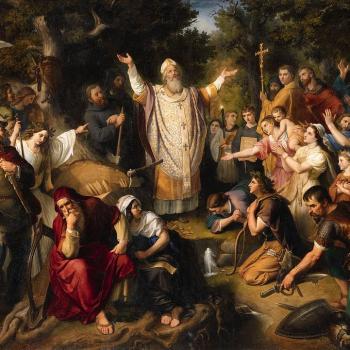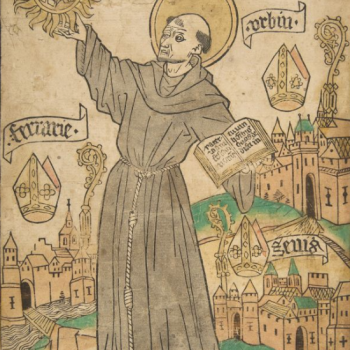 The Christian church followed many of the Greeks in an shift away from the need to offer sacrifices as a way of pleasing God, although they did it for very different reasons. The early church believed that in light of the sacrifice of Jesus on the cross sacrifice was no longer necessary.
The Christian church followed many of the Greeks in an shift away from the need to offer sacrifices as a way of pleasing God, although they did it for very different reasons. The early church believed that in light of the sacrifice of Jesus on the cross sacrifice was no longer necessary.
Jesus had made a sacrifice once and for all and stood in the place of a priest for all the church through all of time. When Christians talked about sacrifice in their worship they did not refer to burnt offerings and slaughtered animals. Instead the language of sacrifice shifted to talking about Communal meals, hymnody and prayer.[1]
Cultic sacrifice was abandoned, but the church still gathered to make another offering. This offering was a thank offering meal, or Eucharist. The early Christians believed this meal was a new kind of זֶ֫בַח or θυσία, a sacrifice where God himself was present in the feast.
- The Jews saw sacrificial communions of this nature as a meal where God in an honored guest.
- The Greeks viewed communion-sacrifices as a way to share in the substance of God himself.
- The Christian Church seemed to believe that both of these things were happening. [2] They would break bread together and that act had a deep spiritual significance.
These believers saw the breaking of the bread as joining in a sacrifice that was at the same time:
- a thanksgiving,
- communal,
- expiatory,
- avertive
- and propitiatory [3].
The church believed these meals were central to their worship and the practice of Eucharistic meals in the early church was found in every place that had communities of Christians.[4]
Although the consensus on sacrificial the practice no longer being needed was broadly understood the theological and philosophical understanding of the new sacrificial understanding was not clearly defined. For there to be any serious consensus on what the Cross of Christ actually did there would have to be a great deal of thinking within the Early Church.












